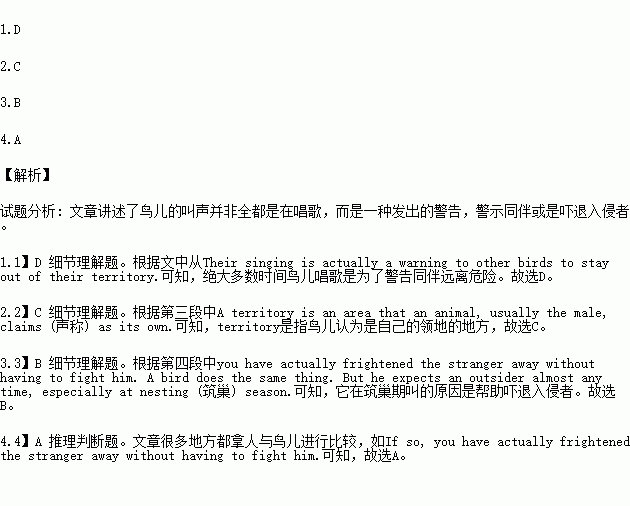题目内容
Have you ever wondered why birds sing? Maybe you thought that they were just happy. After all, you probably sing or whistle when you are happy.
Some scientists believe that birds do sing some of the time just because they are happy. However, they sing most of the time for a very different reason. Their singing is actually a warning to other birds to stay out of their territory.
Do you know what a “territory” is? A territory is an area that an animal, usually the male, claims(声称)as its own. Only he and his family are welcome there. No other families of the same species (物种) are welcome. Your yard and house are your territory where only your family and friends are welcome. If a stranger should enter your territory and threaten you, you might shout. Probably this would be enough to frighten him away.
If so, you have actually scared the stranger away without having to fight him. A bird does the same thing. But he expects an outsider almost any time, especially at nesting(筑巢)season. So he is screaming all the time, whether he can see an outsider or not. This screaming is what we call a bird’s song, and it is usually enough to keep an outsider away.
Birds sing loudest in the spring when they are trying to attract a mate and warn others not to enter the territory of theirs.
You can see that birds have a language all their own. Most of it has to do with attracting mates and setting up territories.
1.Some scientists believe that most of the time birds’ singing is actually __________.
A. an expression of happiness B. a way of greeting
C. an expression of anger D. a way of warning
2.What is a bird’s “territory”?
A. A place where families of other species are not accepted.
B. A place where a bird may shout at the top of its voice.
C. An area which a bird considers to be its own.
D. An area for which birds fight against each other.
3.Why do birds keep on singing at nesting season?
A. Because they want to invite more friends.
B. Because their singing helps frighten outsiders away.
C. Because they want to find outsiders around.
D. Because their singing helps get rid of their fears.
4.How does the writer explain birds’ singing?
A. By comparing birds with human beings.
B. By reporting experiment results.
C. By describing birds’ daily life.
D. By telling a bird’s story.

